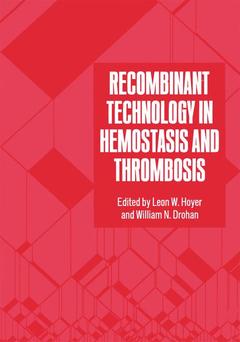Description
Recombinant Technology in Hemostasis and Thrombosis, Softcover reprint of the original 1st ed. 1991
Coordinators: Drohan W.N., Hoyer Leon W.
Language: English
Subjects for Recombinant Technology in Hemostasis and Thrombosis:
Keywords
DNA; biology; genes; molecular biology; mutation; plasma; protein; proteins; thrombosis
Publication date: 10-2012
261 p. · 17.8x25.4 cm · Paperback
261 p. · 17.8x25.4 cm · Paperback
Description
/li>Contents
/li>
Recent progress in molecular biology has led to a rapid expansion of our understanding of the proteins that are essential for hemostasis and thrombosis. The goal of the XXI Annual Scientific Symposium of the American Red Cross was to provide a forum to explore and document the impact of recombinant DNA technology in this field. The speakers described the essential features of the genes responsible for key plasma proteins important in hemostasis, including procoagulant Factors VIII and IX and anticoagulant proteins, Antithrombin III and Protein C. They emphasized the advances in recombinant DNA technology that have led to the cloning of these genes. Careful examination of the gene sequence has then provided a clearer understanding of the structure of the encoded proteins, and has given additional insight into their functional domains and their interactions in hemostasis. At the same time, these advances have made it possible to better characterize hemostatic disorders. A large number of published studies have shown that the mutations affecting biological activity are clustered in areas that define functional domains. They have led to fundamental advances in our understanding of specific diseases and they have made it possible to develop more accurate and sensitive diagnostic tests for the detection of the disease states.
Characterization of Gene and Protein Structure.- Biosynthesis and Assembly of the Factor VIII-von Willebrand Factor Complex.- Factor IX: Gene Structure and Protein Synthesis.- Antithrombin III Genetics, Structure and Function.- Interactions Between the Functional Domains of Antithrombin III.- Protein C: Gene Structure and Protein Synthesis.- Structural and Functional Properties of Protein C.- Molecular Defects Affecting Hemostasis.- Molecular Defects in Hemophilia A.- Molecular Defects in Hemophilia B.- Molecular Defects in Human Antithrombin III Deficiency.- The Biologic Impact of Hereditary Defects that Cause Thrombosis.- Protein Production by Recombinant Technology.- Factors Limiting Expression of Secreted Proteins in Mammalian Cells.- Synthesis of Biologically Active Vitamin K-Dependent Coagulation Factors.- The Expression of Therapeutic Proteins in Transgenic Animals.- Clinical use of Proteins Produced by Recombinant Technology.- The Use of Animal Models to Evaluate Proteins Produced by Recombinant Technology.- Experiences with Recombinant Factor VIIa in Hemophiliacs.- Clinical Trials of Factor VIII Produced by Recombinant Technology.- Clinical Trials of Recombinant Factor VIII.- Concluding Overview.- The Impact of Recombinant Technologies in Understanding Plasma Proteins Important for Hemostasis and Thrombosis.- Contributors.
© 2024 LAVOISIER S.A.S.
These books may interest you

Proteome and Protein Analysis 105.49 €



